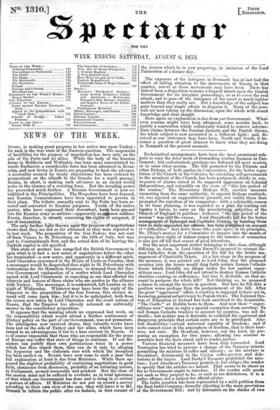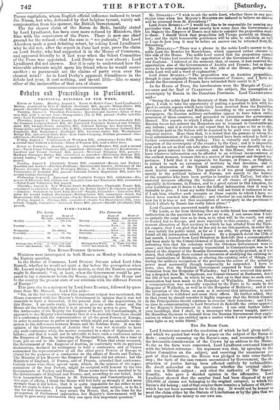over to duly-appointed lay officers, has beta, on account of
" difficulties that deter those who quite agree in its principles. Mr. Phinn's motion for a Committee to inquire into the means of securing their right of habeas corpus to the inmates of nunneries is also put off till that season of good intentions. But the most important matter belonging to this class, although differing in form, is Lord John Russell's proposal to exempt Ro- man Catholics from the operation of the bill for the better ma- nagement of Charitable Trusts. At a late stage in the progress of the measure, it was pointed out to Lord John, that the proposed. scrutiny into the trusts would drag forth certain Roman Catholic trusts which literally are illegal under the law against super- stitious uses : Lord John did not intend to destroy Roman Catholic charities existing on sufferance; but was it desirable on that ac- count to postpone the whole bill Not thinking so, he proposed
i
a clause to exempt the trusts in question. But here he fell into a position worse perhaps than the postponement of the bill. After the great "aggression" affair, a reaction is supposed to have set in, favouring general subserviency to Popish views. The National Sys- tem of Education in Ireland has been sacrificed to the Itomanists. "The Castle" at Dublin bows to them. And now their " super- stitious uses" were to enjoy a special exemption from scrutiny. To call Roman Catholic trustees to account by surprise, was not de- sirable ; but neither was it desirable to establish the equivocal and dangerous principle that certain sects are to be privileged. Abo- lish disabilities—extend universal equality of freedom ; and if sects cannot exist in the atmosphere of freedom' that is their busi- ness, not ours. Mr. Headlam, however, cut the knot, by pro- posing an exemption for two years ; allowing two sessions to ascertain how the facts stand, and to render justice. Various financial measures have been duly forwarded. Lord Torrington has tried to procure a change of the Treasury minute permitting the mixture of coffee and chicory; as the mixture is fraudulent, detrimental to the Ceylon coffee-grower, and dele- terious to the buyer. Lord Derby's Treasury prohibited the mix- ture ; Lord Aberdeen's Treasury permits it, but obliges the vendor to specify that the articles are mixed. That seems to be about as far as Government ought to interfere. If the vendor sells goods not such as they purport to be, or such as are deleterious, it is a police offence, not a subject for official advice. The India question has been represented by a mild petition from the East India Company, formally objecting to the main provisions of the Government Bill ; and by discussion on the claims of two
Parsee capitalists, whom English official influence induced to trust the Nizam, but who, defrauded by that helpless tyrant, vainly ask compensation from his sponsor, the British Government
The far clearer claim of the Baron de Bode, lucidly stated by Lord Lyndhurst, has been onoe more refused by Ministers, this time with the connivance of the Peers. There is now one chief ground for the refusal—that the case is " res judicata." But Lord Aberdeen made a good debating retort, by asking Lord Lyndhurst why he did not, after the report in June-last year, press the claim on Lord Derby, who had supported it in the House of Commons, , and appeared friendly to it last year when the Select Committee of the Peers was appointed. Lord Derby was now absent ; Lord Lyndhurst did not answer. But it is easy to understand how the venerable advocate might spare his friend where he would coerce another ; so paramount are the claims of party even over the clearest mind ! As to Lord Derby's apparent friendliness in the debate last year, it cost nothing, and meant little—like so many other of the insincerities of that mra of shams.



























